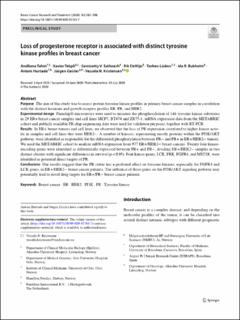| dc.contributor.author | Tahiri, Andliena | |
| dc.contributor.author | Tekpli, Xavier | |
| dc.contributor.author | Somisetty, Venkata Satheesh | |
| dc.contributor.author | DeWijn, Rik | |
| dc.contributor.author | Luders, Torben | |
| dc.contributor.author | Bukholm, Ida Rashida Khan | |
| dc.contributor.author | Hurtado, Antoni | |
| dc.contributor.author | Geisler, Jürgen | |
| dc.contributor.author | Kristensen, Vessela N. | |
| dc.date.accessioned | 2020-11-13T09:38:46Z | |
| dc.date.available | 2020-11-13T09:38:46Z | |
| dc.date.created | 2020-08-05T16:26:43Z | |
| dc.date.issued | 2020 | |
| dc.identifier.citation | Breast Cancer Research and Treatment. 2020, 183, 585-598. | en_US |
| dc.identifier.issn | 0167-6806 | |
| dc.identifier.uri | https://hdl.handle.net/11250/2687726 | |
| dc.description.abstract | Purpose
The aim of this study was to assess protein tyrosine kinase profiles in primary breast cancer samples in correlation with the distinct hormone and growth receptor profiles ER, PR, and HER2.
Experimental design
Pamchip® microarrays were used to measure the phosphorylation of 144 tyrosine kinase substrates in 29 ER+ breast cancer samples and cell lines MCF7, BT474 and ZR75-1. mRNA expression data from the METABRIC cohort and publicly available PR chip-sequencing data were used for validation purposes, together with RT-PCR.
Results
In ER+ breast tumors and cell lines, we observed that the loss of PR expression correlated to higher kinase activity in samples and cell lines that were HER2−. A number of kinases, representing mostly proteins within the PI3K/AKT pathway, were identified as responsible for the differential phosphorylation between PR− and PR+ in ER+/HER2− tumors. We used the METABRIC cohort to analyze mRNA expression from 977 ER+/HER2− breast cancers. Twenty four kinase-encoding genes were identified as differentially expressed between PR+ and PR−, dividing ER+/HER2− samples in two distinct clusters with significant differences in survival (p < 0.05). Four kinase genes, LCK, FRK, FGFR4, and MST1R, were identified as potential direct targets of PR.
Conclusions
Our results suggest that the PR status has a profound effect on tyrosine kinases, especially for FGFR4 and LCK genes, in ER+/HER2− breast cancer patients. The influence of these genes on the PI3K/AKT signaling pathway may potentially lead to novel drug targets for ER+/PR− breast cancer patients. | en_US |
| dc.language.iso | eng | en_US |
| dc.rights | Attribution-NonCommercial-NoDerivatives 4.0 Internasjonal | * |
| dc.rights.uri | http://creativecommons.org/licenses/by-nc-nd/4.0/deed.no | * |
| dc.title | Loss of progesterone receptor is associated with distinct tyrosine kinase profiles in breast cancer | en_US |
| dc.type | Peer reviewed | en_US |
| dc.type | Journal article | en_US |
| dc.description.version | publishedVersion | en_US |
| dc.source.pagenumber | 585-598 | en_US |
| dc.source.volume | 183 | en_US |
| dc.source.journal | Breast Cancer Research and Treatment | en_US |
| dc.identifier.doi | 10.1007/s10549-020-05763-7 | |
| dc.identifier.cristin | 1821898 | |
| dc.relation.project | Helse Sør-Øst RHF: 2719014 | en_US |
| cristin.ispublished | true | |
| cristin.fulltext | original | |
| cristin.qualitycode | 1 | |

